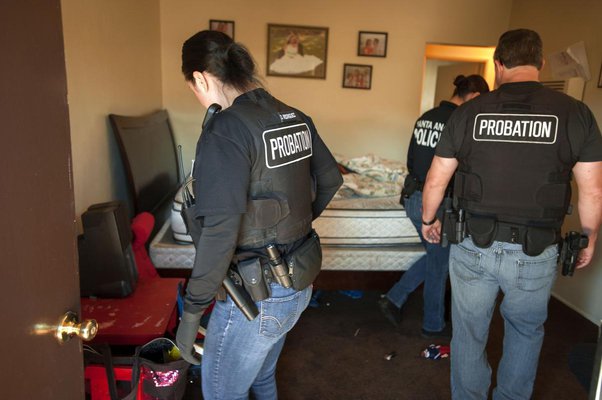A probation officer’s routine check or inspection will include a few things you can expect when a probation officer visits your home. Depending on your location, the parameters of your probation, and the probation officer’s judgment, the particular steps and requirements may change. Some offenders do ask, What Is Not Possible for a Probation Officer? Why do parole officers make house calls?
But these are some typical features you might expect:
The Visit’s Objective
Compliance Check: The main goal of a probation officer’s house visit is to make sure you are following your probation’s rules. This entails abiding by any guidelines set down by the court, such as not committing crimes, going to counseling sessions or treatment centers, or acting appropriately.
Safety Assessment: If you have particular circumstances about housing or family concerns, probation officers may also conduct an assessment of your living situation to make sure it is a stable and safe environment.
Information Verification: The probation officer has the right to confirm the details you submitted during the intake process, including your address, work status, and other personal information.
Document Review: The officer may review any documentation related to your probationary terms, such as treatment program attendance records, employment verification, and receipts for fines or restitution payments.
Conduct Observation: Throughout the visit, the officer will keep an eye on your interactions, mannerisms, and conduct. They might evaluate your general cooperation and compliance.
Communication: The officer may want to talk to you about your progress, difficulties, or any issues you may have with your probation during this appointment.
What to Expect When Probation Officer Visits Your Home: Crucial Advice
Be Ready: Make sure you have all the necessary paperwork and evidence of compliance on hand. This contains employment documentation, payment receipts, and any other records that are required.
Cooperate: Throughout the visit, you also must work with the probation officer. Give honest answers to inquiries and supply any information that is asked for.
Preserve a Clean and Safe Environment: To prevent any infractions, keep your house tidy and clear of anything that is forbidden or illegal.
Pose inquiries: Do not hesitate to contact the probation officer with any questions or concerns. They might offer direction or explanation regarding the conditions of your probation.
Follow-up: To prevent future infractions, take prompt action to resolve any concerns or issues brought up by the probation officer during the visit.
What to Expect from a Probation Officer Who Comes to Your House
Furthermore, an essential function of probation officers in the criminal justice system is theirs.
These officers make sure you follow the terms of your probation by making sure you do as instructed by the court.
One strategy they employ is a house visit.
Generally speaking, a probation officer will visit your home and do the following:
Unexpected Arrival: Probation officers frequently show up without warning. gives them a true picture of your lifestyle and mannerisms.
Also, the policeman will probably walk through your house to inspect it. They look for things like narcotics or illegal weapons that can violate probation requirements, as well as things like cleanliness and safety.
Chatting with Other Residents: The police officer may have conversations with other residents of your house. They have the right to inquire about your actions and compliance with probationary requirements.
Alcohol and Drug Testing: The officer may ask you to take an immediate test if the conditions of your probation forbid you from using drugs or alcohol.
Examining Documents: The officer has the right to request to inspect any pertinent records. Pay stubs, attendance records from the school, or counselor verification could be examples of this.
Talking About Compliance: You and the probation officer will discuss your probationary requirements. They’ll want to know if you’re adhering to curfews, avoiding particular people, and attending necessary meetings or classes.
Offering Resources: The officer may provide resources if you require assistance. These can be recommendations for counseling, assistance with finding a career, or access to educational opportunities.
Handling Concerns: The officer will talk with you about any problems or worries they find throughout the visit. They may offer advice or change the conditions of your probation.
Expectations for the Initial Probation Visit
You can anticipate a sequence of events and exchanges on your initial probationary visit that are intended to:
acquainting you with the probationary period, establishing guidelines, and starting the supervision procedure.
An outline of what to anticipate on your first probation visit is provided below:
- Orientation: You will receive an orientation to the probation procedure from the probation officer. They will go over the goals of probation, your rights and obligations, and the rules you have to abide by.
- Probation Terms Review: You and the probation officer will go over the exact terms and conditions of your probation. Talking about activity limitations, required counseling or treatment, requirements for drug testing, and any other orders the court may have issued may fall under this category.
- Verification and identity: You will be required to present your identity and confirm the accuracy of your data, such as your address, phone number, and job status.
- Documentation: In your case file, the probation officer will record your biographical data, the specifics of your offense, and any other pertinent information. For continuing reporting and oversight, this record is utilized.
- Evaluation: To identify any urgent requirements or potential hazards, the probation officer may carry out a preliminary evaluation. The supervision strategy of the probation officer is informed by this assessment.
- Creation of a Supervision Plan: The probation officer will collaborate with you to create a supervision plan based on the evaluation and the terms of your probation. This plan delineates your probationary duties, objectives, and goals.
- Expectations Discussion: You and the probation officer will speak about what is expected of you during your probationary period. This covers following terms, following directives from the court, and adhering to any particular standards on your case.
- Time of Reporting: You and the probation officer will work up a reporting schedule. The times and frequency of your necessary attendance at supervision meetings at the probation office are specified in this schedule.
- Drug Testing: Your probation officer may provide an initial drug test or explain the procedure for follow-up testing if drug testing is a requirement of your probation.
- Communication: Your probation officer will provide you with their phone number and instructions on how to get in touch with them in the event of an emergency or with inquiries about your probation.
Why Do Parole Officers Make House Calls?
The majority of interactions between probation/parole officers and offenders take place in the form of office appointments, which give the officers a controlled atmosphere in which to have in-depth conversations with criminals. Probation and parole officials are not competing with the TV, kids, wives, phones, and other distractions for the offender’s attention when they are at the office. Office visits provide us with a better opportunity to examine the offender’s supporting documentation and verify records.
Home visits and field checks should not replace office visits, but rather be used in addition to them. Because of the nature of an office visit, offenders can easily fabricate tales, and get family members to tell lies on their behalf. They can also falsify documentation to present a picture of their behavior that is not accurate.
After a few years on the job, each probation/parole officer can undoubtedly recall at least one instance in which an offender said that everything in their life was going well, but upon further inspection, that turned out to be a massive lie.
In probation and parole work, home visits and field checks are vital because they give authorities a more accurate picture of the offender’s life. Officers have the authority to verify that offenders are residing where they claim to be, speak with the offender’s family, view their living arrangements, and search the offender’s belongings for contraband or anything that violates probation or parole requirements.
What Is Not Possible For A Probation Officer?
Probation officers’ restrictions vary depending on the jurisdiction in which they operate.
What a probation officer is not allowed to do is:
- Meet with the probationer outside of probation meetings,
- Go on dates with them, or build a personal relationship with them.
- Make advances in terms of language or intimacy.
- (In certain states, arrest the probationer.)
- Carry a gun (in some states)
- Lift a warrant
- Put drugs in your home during a search
- Revoke probation;
- Alter the conditions of an order from a court;
- Meddle with the legal system
- Give legal advice
- Take payments in any form, including bribes.
- Determine how to resolve a case.
What to Expect When Probation Officer Visits Your Home: FAQs
In Florida, How Can I Locate the Probation Officer of Someone?
Make contact with the relevant probation office.
Next, select the “Probation Office” link. You can give the specified number a call. Get in touch with the county probation office if the probationer is serving time for a state offense.
In North Carolina, how do I exit supervised probation?
Request an Early Termination of Your Probation in North Carolina. Should you complete at least half of your probationary term and keep up a stellar record of not violating any rules during your probationary period, you ought to ask the court to end your probation early.
Which justification works best for probation?
Reasonable infringement.
Probation violations can be justified by family emergencies, personal threats, or other circumstances that compelled the offender to flee the area. The parole board may decide to keep you on probation rather than put you in jail, depending on the situation.
What to Expect When Probation Officer Visits Your Home: Is It Possible to Fail Probation?
As a new hire at an unknown company, you may face a challenging probationary period and potentially fail your trial. After failing your probation, you could engage in the following activities: Retain a cheerful disposition. Examine the reasons why you weren’t a good fit, then strive to be more effective in your next position.
What to Expect When Probation Officer Visits Your Home: Final Thoughts
Although it could seem intimidating at first, having a probation officer visit your house is a necessary step in the probationary period. Being truthful, helpful, and law-abiding will make you look like a responsible homeowner and make the visit go more easily.
Recall that the probation officer’s main objectives are to protect the public and assist your effective rehabilitation. You may make the procedure easier to handle and show that you’re committed to successfully finishing probation by being aware of the visit’s goal, getting your house ready beforehand, and complying completely.
Also, Read
FELONY PROBATION: Rules and Violation Penalties
MISDEMEANOR PROBATION: Rules and Guidelines



